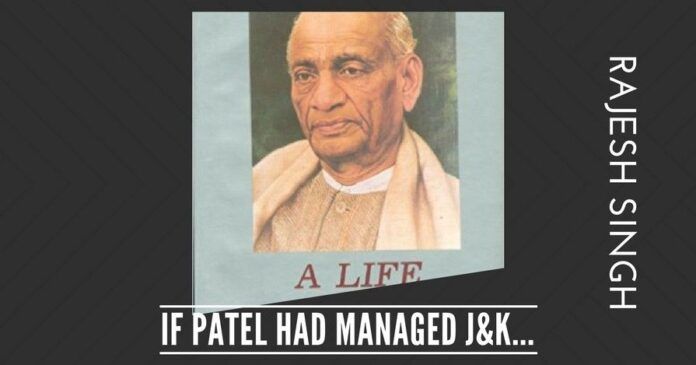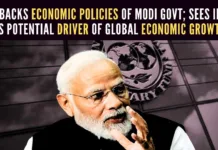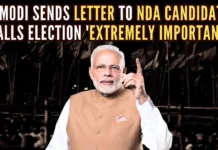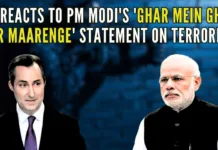
When Prime Minister Narendra Modi rose to speak in Parliament on Wednesday, the prediction was that he would launch a fierce attack on the Congress. But none had imagined that he would take the battle all the way back to the Congress’s greatest icon and independent India’s first Prime Minister Jawaharlal Nehru, and link him to the Jammu and Kashmir problem.
Rajmohan Gandhi speaks of “three apples” in the Sardar’s sack: Hyderabad, Kashmir and Junagadh. India’s Iron Man had a free hand on the first and the last, and the results are there to see. Kashmir was taken away from him, and we suffer the consequences of that to this day.
Modi did that cleverly by introducing the Vallabhbhai Patel factor. He said the J&K issue would have been resolved then and there had Sardar Patel been the country’s Prime Minister. What he left unsaid was that Nehru stood squarely responsible for the mess that continues to bleed the nation.
Appropriating Sardar Patel’s legacy is a work in progress for the Prime Minister and his Bharatiya Janata Party (BJP). There are two drivers of this exercise. The first is that the Sardar belonged to Gujarat, Modi’s home State, and so it’s natural for the Prime Minister to take full advantage of the coincidence. The second, and the more important, reason is that the Congress has over the decades of independence eulogised Nehru to an extent that it has marginalised the role played by stalwarts such as Sardar Patel in not just the country’s freedom struggle but also in shaping the Congress’s fortunes. The BJP was thus given the issue on a platter.
But politics apart, Prime Minister Modi’s remark is not off the mark. Congress Member of Parliament Shashi Tharoor may claim that Modi’s speech was “farrago and half-truth”, but history cannot be denied. It would be helpful to refer to arguably the most well-regarded book on the Sardar — Patel: A Life, by Rajmohan Gandhi[1]. Now, Rajmohan Gandhi is an author of several books and is far from being a Right-winger who can be accused of promoting a ‘divisive’ cause.
Modi had said that the Kashmir matter would not have reared its head had Sardar Patel been the Prime Minister. But it would not have arisen even if the Sardar had been in charge of J&K, as he had been of the other princely States which joined the Indian Union through his gentle persuasion and at times following a bit of arm-twisting. Rajmohan Gandhi’s book is revealing on this aspect. Using his interpretative acumen and material from a variety of sources (which he refers to copiously), the author has constructed a defining account of the Sardar. He quotes a letter that Nehru wrote to the then Maharaja of J&K, Hari Singh, virtually issuing instructions to the king that Sheikh Abdullah “should be the Prime Minister (of J&K) and should be asked to form the Government”. This happened towards the end of 1947. Rajmohan Gandhi remarks that “with this letter, Nehru takes over the shaping of India’s Kashmir policy, a role thus far played by Vallabhbhai as Minister for States.” Until this point, the Sardar was active in Kashmir affairs, while working closely with his Prime Minister.
The author further writes that Sardar Patel gracefully and promptly gave up his direct hold on Kashmir: “The Sardar stepped aside the moment Jawaharlal expressed the wish to stand in his place.” One would have expected Nehru to have reciprocated the grace thereafter. But he quickly put his own team to handle the subject and began to take decisions which displeased Patel because they were not in the national interest. Rajmohan Gandhi offers an interesting interpretation: “While Vallabhbhai thought he had agreed to an independent role by Nehru within the States Ministry, Jawaharlal assumed that Kashmir had been taken out of the Ministry and could be delegated by him…”
The person delegated the responsibility by Nehru was N Gopalaswamy Ayyangar, who took offence at one instance when Sardar Patel expressed reservation over a decision on Kashmir. Here, Nehru sided with Ayyangar, leading Patel to tender his resignation. Somehow the issue was resolved with Mahatma Gandhi’s intervention, and Patel remained. But the sharp differences over handling Kashmir had left an indelible mark on the Nehru-Patel relationship.
It is often said by Nehru’s critics — and most definitely by those in the Right — that Nehru had grievously blundered in taking the Kashmir issue to the United Nations. The author reproduces material from a knowledgeable source who said that “Patel was strongly against the reference (to the UN) and preferred ‘timely action’ on the ground.” However, as Rajmohan Gandhi writes, “Kashmir was Jawaharlal’s baby by now and Vallabhbhai did not insist on his prescriptions when, at the end of December, Nehru announced that he had decided to go to the UN.” The author adds — which vindicates Prime Minister Modi’s recent remark — that “Patel’s misgivings were amply fulfilled after India invited the UN’s assistance… Guided by the British delegate, the Security Council seemed to imply that Pakistan’s case was stronger than India’s.”
And here is the most relevant observation by the author: “The question of vacating the aggression in Kashmir was turned into an ‘India-Pakistan dispute’. Indeed, that is how it gets referred to, even this very day: The India-Pakistan Dispute. Given Sardar Patel’s solid understanding of the ground situation and his repeated advice to Nehru before he was ticked off, it would not be erroneous to conclude that, had the Sardar been in charge of Kashmir, he would have launched a full-scale offensive to recover the part of Kashmir which the Pakistanis had seized, and would have snubbed the advice to approach the United Nations.
Interestingly, according to sources Rajmohan Gandhi quotes, Sardar Patel had earlier shrewdly fobbed off the Muslim League’s plot for a plebiscite in Kashmir. Addressing a large crowd in Junagadh four days after the ruler there had surrendered to Indian forces, the Sardar said: “Pakistan attempted to set off Kashmir against Junagadh. When we raised the question of settlement in a democratic way, they (Pakistan) at once told us that they would consider it if we applied that policy in Kashmir. Our reply was that we would agree to Kashmir if they agreed to Hyderabad.”
Rajmohan Gandhi speaks of “three apples” in the Sardar’s sack: Hyderabad, Kashmir and Junagadh. India’s Iron Man had a free hand on the first and the last, and the results are there to see. Kashmir was taken away from him, and we suffer the consequences of that to this day.
References:
[1] Patel: A Life by Rajmohan Gandhi – Jan 1, 2011, Amazon.com











Look we have our PM saying he’s working on Kashmir, why don’t we trust him and wait for the outcome?
WHY SUBHAS BOSE WAS MADE TO RESIGN BY mahatma? because he khew this young man can upset his plans WHICH WERE BRITISH MADE IN THE NAME OF CONGRESS!
I know RAJMOHAN from days he fought against RAJIV GANDHI , joined AAM AADMI PARTY..
माना PATEL was great & NEHRU was POLISHED CROOK , but , but , what is SOLUTION ?
WE DO NOT WANT WAR ON ON OUR LAND & SOLDIERS TO DIE EVERY DAY.
SNS/DR.ATMARAM GANDHIAN MANAGEMENT MANECKSHAW,
PROFESSNOL PRACTICING PRACTICING ASTROLOGER
LAW STUDENT
SENIOR POLITICIAN
9341268665.
SO? you surrender and give Kashmir to Pakistan? Better get united, vote to Nationalists, expose and punish the JAICHANDS and see every thing will be alright in no time.
nehru admitted before mahatma made him the pm that he was culturally a muslim- in those days it would mean a pakistan first guy. hindus are just not politically smart people. and hence they still can’t control bharat even if they have an unqualified majority. they take the longest possible scenic route before they can get down to real business, and then more often than not it is just too late.